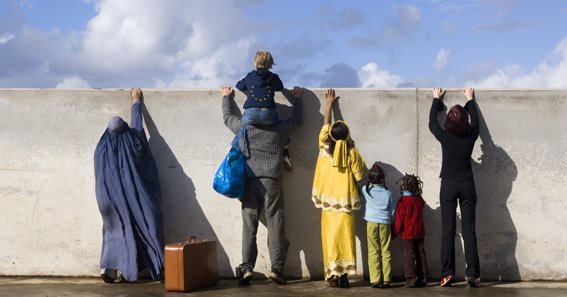Even though discussions and debates on immigration started a long time ago, through the promotion of the Tampere Program 1999, the Hague Program 2004 and the Stockholm Program 2009, it is still difficult to imagine 27 countries discussing around the same table about an efficient, strong and common European immigration policy. Indeed each of them is facing several social movements : borders with Eastern European countries, close relations with North African Countries, equal rights for the new EU Members States, migratory flows into Europe as a consequence of the revolutions in North African states (Tunisia and Egypt) and the current war in Libya, etc. But the EU needs such a strategy. The basic principles which should govern the activities of the EU in this field have been divided as following:
– the development of a common immigration policy driven by the principle of fair treatment of legally-residing third country nationals (TCNs),
– an integration policy granting TCNs rights and obligations comparable to those of EU citizens,
– long-term residents to be guaranteed TCN rights that are “as near as possible” to those of the EU citizens.
Now, it is difficult to conclude if, according to these principles, the EU’s achieved its objective of building up a legitimate common immigration policy.
NEW WAVE OF IMMIGRANTS vs. OLD ARPOACHES AND PRINCIPALS
The biggest groups of third-country nationals in the EU are coming from Turkey (2.3 million), Morocco (1.7 million), Albania (0.8 million) and Algeria (0.6 million). However, the number of foreign-born citizens in some Member States, like France, Sweden, the Netherlands and UK, is higher than the number of third-country nationals as many immigrants acquired the citizenship of the host country [1].
The dynamic of the immigration flows depends on several factors such as: economic and social instability, family reunification, authoritarian political regimes, studies and better professional standards, expectations for a good and decent live, lack of a social security policy in home country, etc. These factors differ according to political, social, cultural and international changes such as wars, poverty and uncertainty. In the context of new international challenges that affect the EU, are the existing legal and institutional framework sufficient or is it necessary to revise the immigration platform and built a new one which would correspond to the new conditions and immigrants situation?
About 30 years ago the first academic literature on the ‘new’ wave of immigration in Europe appeared. These early comparative studies placed this immigration in the context of post-World War II economic recovery, and were cautiously optimistic about the possibility of integration through existing social and political structures. Today, the immigration concept is totally different due to the fact that the EU Member states are no much in favor of “integration” especially concerning labour market competition, in particular among less-educated or less-skilled citizens who fear being forced to compete for jobs with low-skilled immigrants willing to work for much lower wages. The immigrants need security, freedom and stability and they choose the EU because it seems to be the unique possible best variant to ensure a good education, safety and respect of the private life, of religions and of political view.
The EU and its Member States have an incoherent and sometimes incorrect approach to legal and illegal immigration, caused by mismanagement problems. There is still an uncoordinated action in the field of immigration which encourages smuggling and trafficking networks, human rights abuses and trans-border crimes. The EU still has huge problems concerning integration, acceptance level and discrimination attitude towards immigrants. There are still barriers to guarantee a necessary security and social inclusion, family reunification, recognition of professional capacities.
THE NEW IMMIGRATION POLICY FOR A NEW EUROPE
The economic crisis and a series of both political and institutional distractions made 2009 a less than auspicious year for designing a new, forward-looking agenda for immigration and asylum within the European Union. After the crisis and separatist and Euro sceptical social movements in Europe, the population needs more. It’s time to change Europe. It’s time to develop a new Europe- the stronger and reinforced one, a space of good relations which could guarantee a coherent, correct and objective attitude towards the immigrant population.
However in the context of the new international situation, it is obvious that a new policy is required. The new Policy should be based on a comprehensive and balanced approach of the management of migratory flows considering both humanitarian and economic issues and respecting all relevant international human right clauses. It should give a new perspective of new principals :
– multiculturalism and antidiscrimination : the slogan of the EU “unity in diversity” should include not only citizens but also people living on the EU territory even though they are immigrants. The slogan should be a guarantee for everybody.
– employment standards : the EU labour market needs integration of immigrants in such areas as technology, agriculture, construction, and services. Thus, the EU’s capacity for a legitimate, coherent and migrants’ rights compliant policy on labour immigration is more than ever at a test in light of the political priorities set in the EU’s 2020 Strategy.
– family and educational aspects : there are already rights recognition such as access to employment and to education/training and equality of treatment but the EU should adopt real tools to implement these guarantees.
– participation and access : develop/improve a communication platform at the national level to give the immigrants the chance to participate to the administration of the immigrants communities, diasporas, etc. with national/local authorities.
– cohesion and integration : integration of third-country nationals is a process of mutual accommodation by the host societies and the immigrants. It represents an essential factor in realizing the full benefits of immigration that is why it is so important to create a cooperation spirit among EU citizens and immigrants communities; to work better with communities in order to support them to adapt to the EU standards.
– demography and social development : in January 2006, the third-country nationals residing in the EU were about 18.5 million, i.e. 3.8% of the total population of almost 493 million4. Immigration is still the main driver of their EU demographic growth. Net migration, ranging between 0.5 and 1 million per year for most of the 1990s, has increased to levels ranging between 1.5 and 2 million since 2002 [2].
In this context, it is above all necessary to propose a Single Immigration Policy that should be implemented by the European Commission and managed by a special Immigration Office under the democratic control of the European Parliament which would determine the legal framework . Secondly, considering that the Single Immigration Policy should take into account the capacity of reception of each Member State and should assist countries who take up many immigrants, especially at a financial level. Last but not least, it is necessary to encourage the administrations and agencies of the Member States to work in partnership and transparency with the Immigration Office of the European Commission. All these things are possible if Member States determine their own integration policy to accommodate and familiarize the new Europeans with the society they live and work in.


Follow the comments: |
|
